Michelin-Starred Dining Experiences in Dubai
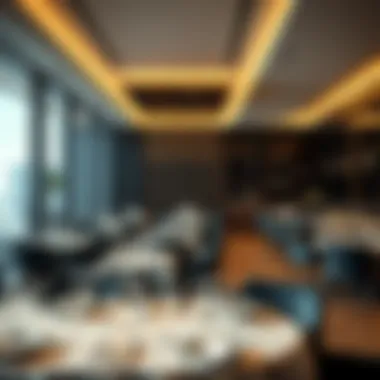

Intro
Dubai has transformed into a culinary powerhouse over the years, attracting food lovers and investors from across the globe. The arrival of Michelin-starred restaurants has heightened the city's appeal, elevating its already dynamic dining scene. Understanding the impact and significance of these culinary establishments is crucial for anyone interested in the gastronomic trends within the city. Michelin stars are not just awards; they represent a certain standard and an aspirational quality that can draw patrons who are eager to indulge in extraordinary dining experiences. In this article, we’ll explore the Michelin restaurants in Dubai, their contributions to the local culture, and the wider implications for investors and food enthusiasts alike.
Market Trends
The gastronomic scene in Dubai is not just about indulgence; it mirrors the economic landscape. As such, the correlation between the restaurant industry and property markets cannot be overlooked. The increasing number of Michelin-starred restaurants indicates a burgeoning demand for luxury dining, which in turn impacts real estate and investment opportunities.
Current Property Prices and Forecasts
Dubai’s property prices continue to fluctuate, often aligned with the city’s status as a luxury destination. Recent trends show an uptick in property values, particularly in areas where Michelin-starred dining options are available. Investors and expatriates are keen to purchase properties close to these culinary hubs; thus, areas that house such restaurants often witness higher property appreciation.
Popular Neighborhoods and Emerging Areas
Neighborhoods like Downtown Dubai and the Dubai Marina have established themselves as gastronomic hotspots, largely due to Michelin-starred places like Atmosphere and Nobu. These areas are often favored by homebuyers looking for luxury and convenience. However, locations such as Al Quoz and Jumeirah are emerging, thanks to a mix of cultural experiences and innovative restaurants that are not only nurturing local chefs but are also gaining international acclaim.
"Investors seeking long-term value in Dubai should consider areas around Michelin restaurants, as they contribute significantly to residential and commercial desirability."
Investment Insights
Investing in Dubai's real estate market offers unique advantages, especially for those who understand the correlation with high-end dining trends. The explosion of Michelin-starred restaurants highlights evolving consumer preferences and can inform investment strategies.
Tips for New Real Estate Investors
- Research: Before jumping in, know the neighborhoods that are booming, particularly those near Michelin-star establishments.
- Culinary Trends: Stay updated on food trends as they influence property desirability.
- Consult Experts: Seek advice from realtors familiar with the Dubai market’s nuances.
- Consider Lease Opportunities: Look for investment properties that can be leased to restaurateurs as they often seek high foot traffic locations.
Benefits of Investing in Dubai Properties
Investing in Dubai real estate can be exceptionally lucrative, given the right conditions. Benefits include:
- Tax Benefits: Dubai offers a zero-income tax policy, which is appealing for expatriates.
- High ROI: Properties in strategic locations can yield impressive returns, especially where Michelin restaurants drive traffic.
- Cultural Capital: Investing in areas abundant with culinary experiences often leads to higher occupancy rates in residential properties.
Foreword to Michelin Restaurants in Dubai
The world of fine dining often comes wrapped in the prestige of Michelin stars. Dubai, with its rich tapestry of cultures and a rapidly developing culinary scene, is now part of that exclusive club. Understanding Michelin restaurants in Dubai is about more than just food; it reflects the city’s ambition and the evolving palates of its residents and visitors alike. As this article unfolds, we will dive into the significance of these restaurants within Dubai’s broader gastronomic landscape, highlighting how they shape perceptions, attract tourism, and impact the local economy.
Defining Michelin Ratings
Michelin ratings have become more than mere stars; they symbolize culinary excellence and meticulous craftsmanship. The Michelin Guide, which began as a travel guide in France, utilizes anonymous inspectors who evaluate restaurants based on several criteria, including the quality of ingredients, the mastery of technique, and the harmony of flavors. A meal might be rated with one to three stars:
- One Star: A very good restaurant in its category.
- Two Stars: Excellent cooking that is worth a detour.
- Three Stars: Exceptional cuisine, worth a special journey.
In essence, a Michelin rating represents a blend of tradition and innovation, pushing chefs to excel and diners to seek outstanding meals. For Dubai, these ratings are not just accolades; they are cornerstones that elevate the city's image globally in rich culinary circles.
The Arrival of Michelin in Dubai
The Michelin Guide made its long-awaited debut in Dubai in 2022, which sent ripples through the local and international dining community. Prior to this, the city was known for its extravagant restaurants and celebrity chefs, but the formal recognition by Michelin has added a new layer of prestige.
This arrival signifies a critical juncture for Dubai, as it positions itself on the global gastronomic map. The inclusion of several restaurants with Michelin stars highlights the exceptional talent among chefs who draw inspiration from the city’s diverse demographics. The culinary styles range from Middle Eastern to Mediterranean, and Asian fusion, emphasizing both local ingredients and global techniques.
With Michelin's presence, Dubai desires not just to attract food enthusiasts but also to strengthen its reputation as a culinary destination. This initiative encourages hospitality groups and entrepreneurs to invest in innovative dining concepts, which ultimately enriches the flavor palette available in the city.
“The Michelin star is not just an honor; it’s an invitation for chefs to innovate while keeping tradition intact.”
Significance of Michelin Stars
The significance of Michelin stars goes beyond just those shimmering icons that decorate the walls of top-tier restaurants. In the world of gastronomy, these stars have become synonymous with excellence and prestige. For Dubai, a city rich in culture and culinary diversity, the arrival of Michelin-starred establishments has marked a significant turning point in its global culinary reputation, making it a hub for fine dining that attracts tourists and locals alike.
Impact on Culinary Reputation
Michelin stars do not merely indicate good food; they signify an unwavering commitment to quality and innovation in the culinary arts. When a restaurant earns a star, it’s like a badge of honor that can greatly influence its prestige within the competitive dining market. In Dubai, where culinary fusion is the name of the game, the pursuit of a Michelin star can drive chefs to push boundaries, combining traditional fare with modern techniques.
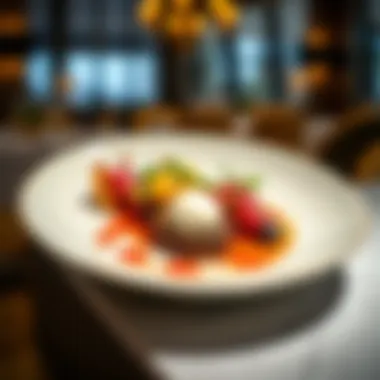
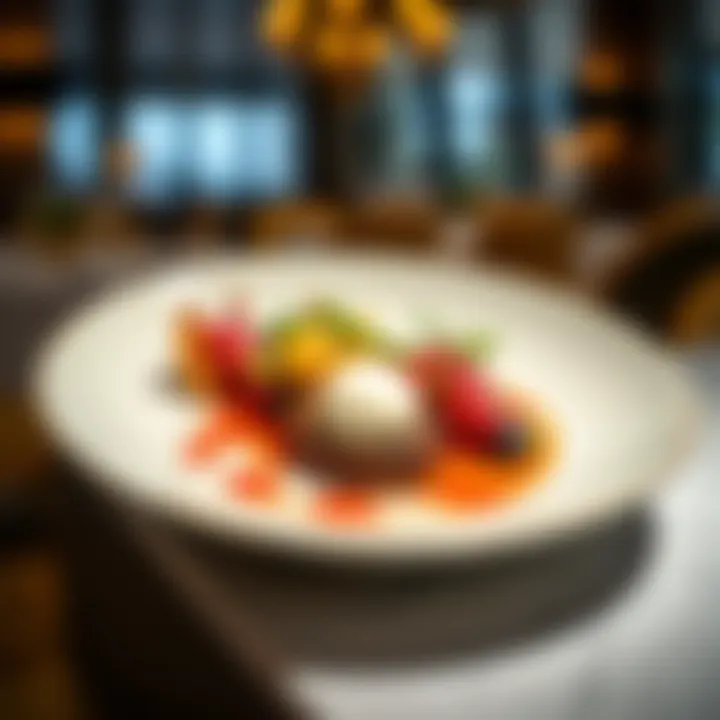
- Attracting Talents: Top chefs flock to Michelin-rated venues, eager to showcase their creativity and skills.
- Inspiring Standards: Restaurants often aim to emulate the success seen in Michelin-starred places, raising the overall quality of the dining scene.
The ripple effect of this prestige can be profound. A Michelin star can elevate a restaurant from obscurity to stardom almost overnight, pulling in patrons who are keen to explore the tastes that have earned these prestigious accolades. Additionally, food enthusiasts see Michelin stars as a signal for the highest quality, guiding their dining choices and helping them navigate through the plethora of culinary options in Dubai.
Economic Implications for Dubai
The economic ripple from Michelin stars is significant. Dubai’s culinary scene transforms as these esteemed establishments draw not just local patrons but also international food tourists. This influx has potential benefits that extend into various economic sectors.
"A Michelin star isn’t just about the food; it’s a golden ticket that can open many doors for the entire economy."
- Tourism Boost: Michelin-rated restaurants can enhance an area’s appeal, spotlighting Dubai as a culinary destination where food lovers can indulge.
- Job Creation: As new establishments pop up, so do opportunities for local talent in the culinary industry, from front-of-house staff to skilled chefs.
- Real Estate Development: Rising demand for prime dining locations can spike interest in properties around these eateries, prompting real estate growth and investments.
Consequently, for investors looking to penetrate the food sector, the Michelin stars represent more than just prestige; they can be indicators of lucrative opportunities, marking a connection between culinary excellence and economic vitality in Dubai. Investors, realtors, and entrepreneurs can leverage this success to foster even deeper cultural and business ties in the region, enhancing the overall culinary tourism landscape.
In summation, the significance of Michelin stars in Dubai transcends the realm of fine dining. The impact on culinary reputation is undeniable, propelling chefs to new heights and setting benchmarks for quality. Moreover, the economic implications offer a compelling narrative of growth and opportunity within Dubai's vibrant culinary scene.
Notable Michelin-Starred Restaurants
Notable Michelin-starred restaurants in Dubai are not just places to eat; they reflect the pinnacle of culinary artistry and excellence within the city. Each establishment offers something unique, contributing to redefine the city's image in the global culinary arena. The sheer variety of these restaurants showcases Dubai's diverse cultural influences, promising an experience that is both exotic and familiar.
Fine Dining at Home
Fine dining has taken on a new meaning in Dubai, where luxury meets convenience. In a city where culinary talent thrives, several Michelin-starred chefs have adapted their menus for guests who prefer to enjoy gourmet meals from the comfort of their homes.
Take NOBU Dubai, for instance. Renowned for its fusion of Japanese-Peruvian cuisine, NOBU’s take-home offerings maintain the same standard as dining in-house. With dishes like Black Cod Miso that can spark an instant culinary class right in your kitchen, the dining experience shifts, yet remains exceptional. This trend allows food enthusiasts to engage directly with the Michelin star experience even when they can't visit the restaurant itself.
Likewise, you might come across Bleu Blanc, led by Chef David Myers. Here, the home dining options embrace Mediterranean flavors, frequently surprising people with their authenticity, alluring aroma, and vibrant presentation. Hence, the fine dining at home trend not only brings Michelin-star experiences to personal spaces but also encourages diners to explore tastes in a new light.
Emerging Culinary Stars
Another compelling facet of Dubai's Michelin landscape is the rise of emerging culinary stars. The city is progressively becoming a nurturing ground for young chefs with visions that steer away from the ordinary. These chefs are ambitious and innovative, often blending local traditions with global techniques, creating a remarkable dining space.
Il Ristorante - Niko Romito at the Bvlgari Resort exemplifies a fresh take on Italian cuisine, where a focus on simplicity elevates humble ingredients to spectacular heights. Here, the chef’s relentless pursuit of perfection resonates throughout the menu. The dining experience cleverly combines a chic setting with dishes that tell a story rooted in the chef's heritage.
Moreover, At.mosphere, perched on the 122nd floor of the Burj Khalifa, represents modern twists crafted by its culinary team that promise to deliver not just a meal, but a breathtaking skyline view alongside exquisite flavors. This restaurant complements its high-altitude dining with an ambition to push boundaries, making it a notable highlight of the city's culinary emergence.
Exploring Diverse Flavors
Exploring diverse flavors is truly where Dubai shines in the culinary spotlight. With its multicultural population, the city boasts an unparalleled tapestry of food influences, which is vividly reflected in its Michelin-starred venues. The fare available often transcends typical categorizations, resulting in a range of temptations for any palate.
Restaurants like Zuma offer a contemporary Japanese izakaya-style dining experience, serving up everything from beautifully crafted sushi to comforting ramen. Each dish invites diners to savor deep umami flavors that leave a lasting impression.
Additionally, consider Coya, which serves vibrant Peruvian dishes. Coya embodies a lively atmosphere full of energy, making it more than just a restaurant but a cultural experience itself. The marriage of local ingredients with traditional South American preparations gives diners a taste of something truly unique.
The culinary scene in Dubai serves as a testament to the city's ability to reinvent itself continuously.
In closing, as Dubai emerges as a hub for Michelin star dining, it not only celebrates established stars but also embraces newcomers and eclectic flavors from around the globe. Understanding the landscape of these restaurants offers investors, expatriates, and food lovers an in-depth view of what makes Dubai's dining experience truly remarkable.
Culinary Trends in Dubai
Dubai’s culinary landscape has experienced a remarkable transformation. As the city continues to grow, it is becoming a stage for innovative culinary practices. This section digs into the culinary trends shaping Dubai’s restaurant scene, particularly concerning Michelin-starred establishments. The trends aren't just cosmetic changes; they’re reflections of cultural shifts and evolving tastes, making the exploration of these trends vital for anyone invested in Dubai’s gastronomy.
Fusion Cuisine
Fusion cuisine has taken Dubai by storm, merging traditional flavors with modern techniques. This concept is more than just sprinkling spices from one culture onto a dish from another; it involves a creative collaboration between chefs to craft a unique experience that tells a story. For instance, the blending of Indian spices with classic French techniques can be seen in places like At.mosphere, located in the Burj Khalifa.
The beauty of fusion lies in the empowerment it offers to chefs, allowing them to experiment and push boundaries. Diners are no longer satisfied with just traditional dishes; they seek adventure on their plates. Some restaurants, such as Zuma and Nobu, have elevated the concept further by incorporating elements from multiple culinary backgrounds, creating a dining adventure that's both familiar and exotic.
- Landmarks of fusion in Dubai include:
- Japanese-Peruvian Nikkei cuisine
- Arabian-Mediterranean flavors
- South Asian and Western combinations
This trend not only broadens the culinary horizon for residents but also attracts a global audience eager to experience flavors that reflect Dubai's multicultural tapestry. With expats from various countries, the demand for unique food combinations has naturally risen, fostering an environment where fusion can thrive.
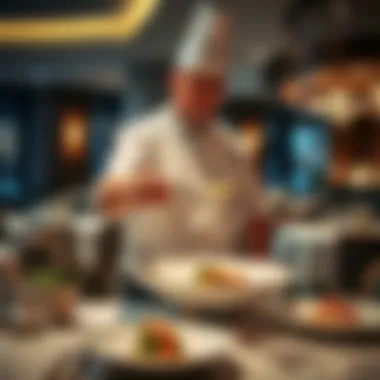
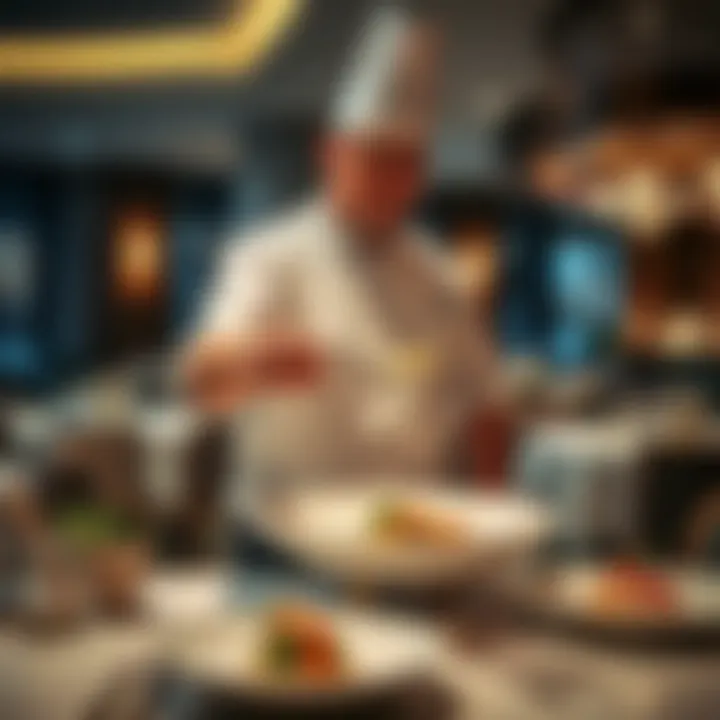
Sustainability in Fine Dining
Another significant trend in Dubai’s dining scene is the rise of sustainability in fine dining. As the world becomes more aware of environmental issues, restaurants in Dubai are stepping up, embracing sustainable practices in sourcing ingredients and minimizing waste. It’s not just a trend; it’s an evolution reflecting changing values.
Many Michelin-starred restaurants have initiated steps toward sustainability. This includes cultivating relationships with local farms and ensuring that seafood comes from responsible fisheries. Not only does that enhance the quality of the dishes served, but it also reinforces community ties and supports local economies. Restaurants like Il Borro Tuscan Bistro have made strides here, championing local and organic ingredients while promoting eco-friendly practices in their operations.
"Sustainability is not just about the environment; it’s about the entire ecosystem of dining, from farm to table."
As the demand for transparency grows, diners are becoming more interested in where their food is coming from, leading to an informed clientele that will choose restaurants making a conscious effort to be environmentally friendly.
Consider these key aspects of sustainability in Dubai's fine dining:
- Waste reduction initiatives: Many restaurants are adopting composting and recycling processes.
- Local sourcing: Using local produce not only reduces carbon footprints but also supports local farmers.
- Seasonal menus: Adjusting menus according to seasonal availability ensures freshness and promotes biodiversity.
In summary, the culinary trends in Dubai, especially fusion cuisine and sustainability in fine dining, play a powerful role in shaping the city's gastronomic narrative. For investors, the growth and sustainability in these areas present not only opportunities but an invitation to be part of a vibrant and responsible culinary movement.
Dining Experiences Beyond the Stars
Dining experiences that go beyond Michelin stars are as rich and layered as the city they thrive in. In Dubai, a place renowned for its extravagant lifestyle and diverse population, the culinary scene reflects both tradition and innovation. This aspect of dining is importan not only as a way to experience amazing food but also as a social activity where memories and stories are shared. While Michelin stars shine brightly, there is much more to the gastronomic landscape that shapes how residents and visitors interact with food.
Casual yet Exceptional
In the bustling streets of Dubai, not every memorable meal comes from a white tablecloth restaurant with a starry ceiling. Casual dining spots are carving their niche, providing exceptional fare that invites diners to let their guard down. Think about a cozy setting that may serve spiced shawarma or spicy dimsums, where the focus is not just on the gourmet but on the shared experience of food with friends or family. These restaurants are hubs of community, offering dishes that resonate on a personal level.
The vibe in these eateries is relaxed yet sophisticated. They cater to those who appreciate good food without the formalities often associated with fine dining. This includes places like the Ravi Restaurant, which brings authentic Pakistani flavors to the forefront amid a casual setup or Bu Qtair, famous for its fresh fish and laid-back atmosphere. In such venues, each meal can be a story, be it about the way the spices dance in a curry or the tale behind the region of origin for the fish being served.
With prices that allow for frequent visits, these restaurants not only satisfy hunger but often become a part of the diner's routine. The atmosphere encourages dialogue, laughter, and a connection to the community. Dining, in this sense, is not just about food; it becomes a vessel through which stories are shared and experiences are created.
Cultural Influences in Culinary Practices
The rich tapestry of Dubai's culinary experiences is deeply influenced by its diverse cultural landscape. Travelers and expatriates from all corners of the globe have brought their culinary traditions with them, creating a melting pot where various cultural influences collide. From Indian spices dominating street food to Italian trattorias nestled in high-end malls, the flavors available are as varied as the people who prepare them.
This intercultural exchange leads to exciting culinary practices that sometimes redefine classic dishes. Consider how Italian chefs blend local spices into traditional pasta dishes, or how Lebanese mezze platters are reimagined with a contemporary twist. These experiments showcase a willingness to be creative and to adapt, resulting in unique dishes that might not be found anywhere else in the world.
Moreover, traditional cooking methods are increasingly interspersed with modern techniques. A restaurant may serve an age-old Emirati dish, such as Al Harees, but with a culinary approach that elevates the experience, using sous-vide techniques or note-worthy presentations that surprise and engage diners. Not only does this promote cultural heritage, but it sparks curiosity about the origins of these dishes, encouraging diners to appreciate the glorious collision of history and innovation on their plates.
"Food is the ingredient that binds us together."
Ultimately, the range of dining experiences in Dubai embodies not just flavors but traditions, connections, and shared memories. Whether at a casual eatery or a Michelin-starred restaurant, each meal is a potential story waiting to unfold, contributing to the dynamic and evolving culinary narrative of the city.
The Role of Food Critics and Reviewers
The culinary landscape is often shaped as much by the voices that speak for it as by the chefs who create the dishes. In a bustling metropolis like Dubai, the role of food critics and reviewers takes on heightened significance. They don’t just rate a restaurant; they profoundly influence public perception, drive foot traffic, and even affect business strategies. For investors and entrepreneurs in the culinary sector, understanding these voices can provide invaluable insights into market trends and diner expectations.
Understanding the Evaluation Process
To grasp the impact of food critics, one must first comprehend how they arrive at their evaluations. This is no haphazard affair; there’s a method to the madness. Critics typically consider several key elements during their reviews, which include:
- Taste: The most fundamental aspect is the flavor and quality of the food. Critics will analyze everything from seasonality and freshness to presentation and seasoning.
- Ambiance: A restaurant's atmosphere plays a pivotal role. A well-set table can elevate a dining experience, while the wrong lighting can bring it crashing down. Critics assess how the atmosphere complements the food.
- Service: Attentive yet unobtrusive service is a hallmark of great dining. Reviewers keep a keen eye on the staff's knowledge and attitude toward guests.
- Value: Does the dining experience match the expense? Critics balance the quality of the meal with its cost, a vital metric for restaurant patrons.
Understanding these criteria helps restaurant owners refine their offerings and cater to diner preferences more effectively. It's a complex puzzle where each piece contributes to the overall dining picture.
The Influence of Online Reviews
In recent years, the rise of digital platforms has significantly altered the food review landscape. No longer are critics the only voices that matter; everyday diners now have platforms to share their experiences globally. Online reviews have the potential to make or break a restaurant, especially those eyeing a Michelin star. Consider the following points about the influence of online reviews:
- Accessibility: Websites like Yelp, TripAdvisor, and Google Reviews enable diners to voice their opinions instantly. This democratizes ratings, allowing anyone with a smartphone to contribute to the culinary dialogue.
- Real-Time Feedback: Unlike traditional reviews that might come weeks or months after a visit, online reviews provide immediate feedback. Chefs and restaurant managers can respond quickly to both praise and criticism, adapting their offerings in near real-time.
- Trust Factor: Many diners tend to trust peer reviews over professional critic assessments. A five-star rating from a local patron can sway a potential diner more than a professional review would.
- Cultural Commentary: Online reviews often reflect broader cultural sentiments or trends. For instance, diners might pay special attention to sustainability practices or the incorporation of local ingredients, influencing restaurant direction.
“In Dubai, where culinary diversity is a point of pride, online reviews can usher in a new wave of gastronomy, shaping preferences as quickly as taste buds can adapt.”
In essence, food critics and online reviewers share a symbiotic relationship that benefits the culinary scene in Dubai. Professional critics provide structured evaluations that lend credibility, while everyday diners offer grassroots insight that reflects genuine experiences. For aspiring restaurant moguls and seasoned chefs alike, paying attention to both spheres can create a recipe for success.
Culinary Scene Diversity in Dubai


Dubai's culinary scene stands out as a vibrant tapestry woven from various cultural threads. This diversity is not just a matter of preference but a reflection of the city's identity as a melting pot of traditions, flavors, and cooking techniques. The significance of this topic in relation to Michelin-starred restaurants becomes clear when we consider how the eclectic nature of the culinary scene influences the standards and creativity exhibited by local chefs and establishments.
One of the key elements that enrich Dubai's culinary landscape is its multicultural population. People from different backgrounds coexist in the city, each bringing their own gastronomic heritage to the table. The fusion of these diverse cultures results in a unique food culture where traditional recipes can be reinterpreted in innovative ways. For investors and entrepreneurs in the culinary sector, this diversity presents a range of opportunities to cater to varied tastes and preferences.
Moreover, Dubai's strategic location as a gateway between East and West allows it to be a hub for international cuisines. From traditional Emirati dishes to contemporary French or Japanese dining options, the city offers a smorgasbord of flavors that can satisfy any discerning palate. This aspect draws not just locals but also tourists and expatriates seeking authentic culinary experiences.
Benefits of Culinary Diversity in Dubai:
- Attracts a Global Audience: The incorporation of various culinary styles ensures that there’s something for everyone, making Dubai a preferred destination for food lovers.
- Encourages Innovation: Chefs are motivated to experiment with different ingredients and techniques, leading to groundbreaking culinary creations.
- Supports Local Farming: With diverse cooking practices, there’s often a growing demand for local produce and ingredients, benefiting local farmers and suppliers.
Considerations:
- Maintaining Quality: As restaurants expand their menus to include more diverse options, there’s a risk of diluting quality.
- Cultural Sensitivity: Respecting the origins and traditions of various cuisines is vital in ensuring authenticity and credibility.
"Quality and creativity stem from understanding where food comes from. In a diverse culinary scene, each dish tells a story that shapes our dining experience."
Cultural Melting Pot
The idea of Dubai as a cultural melting pot is not just a fanciful notion. The city exemplifies a confluence of traditions, particularly in its food. Streets lined with eateries showcase influences from not just the Middle East but also Asia, Europe, and beyond. Middle Eastern dishes often find their way into international menus while restaurants showcasing Indian, Pakistani, and Filipino cuisines thrive side by side with European fine dining establishments. This intersection results in food experiences that enhance the rich culinary narrative of the city.
Emerging International Provinces of Taste
As the culinary landscape in Dubai evolves, certain neighborhoods are emerging as hotspots for international cuisine. Areas like Downtown Dubai, with its upscale dining venues, and older neighborhoods where locals dine, exhibit distinct flavors. New international restaurants continue to pop up, reflecting the tastes of expatriates and tourists alike, further enriching the food scene. With Michelin's gaze fixed on Dubai, these culinary provinces are likely to play an even more prominent role in shaping the city's future dining landscape.
Investing in Dubai's Culinary Sector
Investing in Dubai's culinary sector is not just about opening a restaurant; it's an intricate dance of opportunity, culture, and capital gains. The rise of Michelin-starred establishments symbolizes a shift in Dubai's dining narrative, drawing food enthusiasts and daring investors alike into a bustling arena where culinary excellence meets innovative entrepreneurship. With the spotlight on gastronomy as an economic driver, individuals looking to venture into this thriving market are in for a whirlwind of potential benefits and hurdles.
Opportunities for Gastronomy Ventures
Dubai's culinary landscape is a melting pot of cultures, with a unique fusion of global flavors. This presents a myriad of opportunities for those looking to invest:
- Diverse Cuisine Options: From authentic local dishes to international fare, there’s a demand for a variety of culinary experiences. Investors can tap into the trend of experiential dining that combines both culture and gastronomy.
- Untapped Market Segments: While many restaurants focus on high-end dining, there’s room for casual yet high-quality eateries that cater to both the local population and tourists. Food trucks and pop-up restaurants are gaining popularity, offering a lower barrier to entry.
- Sustainable Practices: With sustainability becoming a key concern globally, there’s an increasing appetite for restaurants that prioritize organic ingredients and eco-friendly practices. This not only attracts conscientious consumers but can also enhance brand loyalty.
"Investing in Dubai's culinary scene is akin to planting a seed in fertile soil; with the right nurturing, it can grow into something extraordinary."
- Event Hosting: The trend of hosting culinary experiences, such as wine tasting dinners or themed nights, opens additional revenue streams. By collaborating with celebrated chefs or local culinary schools, investors can create dynamic and engaging events that attract crowds.
Challenges and Considerations
While the prospects are enticing, investors must also navigate a landscape fraught with challenges:
- Regulatory Framework: The culinary landscape in Dubai is subject to strict regulations and oversight. Investors must be well-versed in licensing processes and health regulations, which can sometimes be tedious and time-consuming.
- High Competition: The influx of dining establishments means that standing out requires innovation and uniqueness. Investors need to adopt marketing strategies that showcase their offerings while also understanding the clientele's preferences.
- Economic Fluctuations: The culinary sector often reflects broader economic conditions. Fluctuations in tourism and local spending can greatly influence restaurant performance. Investors should be cautious and consider contingency plans during periods of economic uncertainty.
Closure
The significance of the Michelin dining experience in Dubai extends beyond mere culinary luxury; it encapsulates the city’s rapid evolution as a global epicurean capital. The article has illuminated the multiple facets of Michelin-starred restaurants, showcasing not just their quality and artistry, but also their role in establishing Dubai as a serious contender on the international gastronomic stage.
Reflecting on the Growth of Gastronomy in Dubai
Over the past few years, Dubai has witnessed a culinary renaissance. From humble street food vendors to lavish fine dining establishments, the variety and quality of food have surged dramatically. Michelin stars awarded to local restaurants serve as a testament to this growth, encouraging chefs and restaurateurs to innovate and elevate their offerings. With each star awarded, it becomes evident that Dubai is not just a transient location for tourists but rather a destination where culinary art flourishes.
Consider the transformative power that Michelin recognition has had on culinary professionals. It motivates chefs like Atul Kochhar, who aims to bring authentic Indian flavors to the forefront of fine dining, or Habib Hadad, who merges traditional Arabian elements with modern techniques. The stars compel these creators to sharpen their skills, resulting in an edible narrative that tells a story about Dubai's diverse cultural influences.
In addition, the growth of gastronomy in Dubai fosters community and collaboration among culinary experts, highlighting the importance of mentorship and knowledge-sharing. Restaurants are now more inclined to support local farms and producers, contributing to sustainability in the gastronomy sector. Collectively, this creates an ecosystem where innovation thrives, benefiting not only the chefs but the larger community as well.
The Future of Michelin Dining in the Region
As we gaze into the crystal ball regarding the future of Michelin dining in Dubai, the horizon appears promising. The continual influx of global talent and culinary trends will likely further enhance the dining landscape. The Middle East as a burgeoning culinary hub hints that the Michelin guide will pay even more attention to this region, with hopes of expanding to include even more ambitious projects in the culinary scene.
The increasing demand for diverse culinary experiences might lead to the emergence of eatery concepts that emphasize health, sustainability, and local authenticity. As consumers grow more conscientious about what they eat, restaurants will have to adapt, incorporating these values into their menus. Given that the Arab Summer, with its bountiful harvest of fresh produce, inspires new dish creation, expect chefs to capitalize on seasonal ingredients as never before.
Additionally, advancements in technology and dining experiences are set to reshape how diners engage with cuisine. Augmented reality menus or interactive dining is no longer a fantasy but rather an approachable reality. Inclusive dining trends might see a rise in gastronomy that accounts for dietary restrictions, ensuring that Michelin-starred dining becomes accessible to an even broader audience.
Ultimately, Michelin's continuous expansion in Dubai’s culinary stage reflects the broader growth of a dining culture that values artistry, sustainability, and cross-cultural experiences. As the stars continue to shine upon Dubai, they serve as a beacon of the incredible journey this culinary scene is on and the adventures yet to come.
"The Michelin star is not merely an accolade; it reflects artistic vision, dedication, and a journey that continually pushes the boundaries of gastronomy."
In essence, as we reflect on the various developments highlighted throughout this exploration, it’s clear that both the local and global culinary scenes as a whole will keep adapting and growing alongside these exceptional dining experiences in Dubai.

